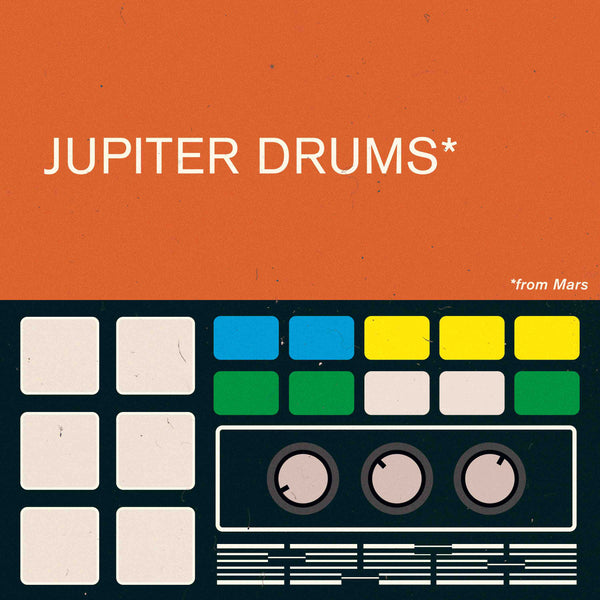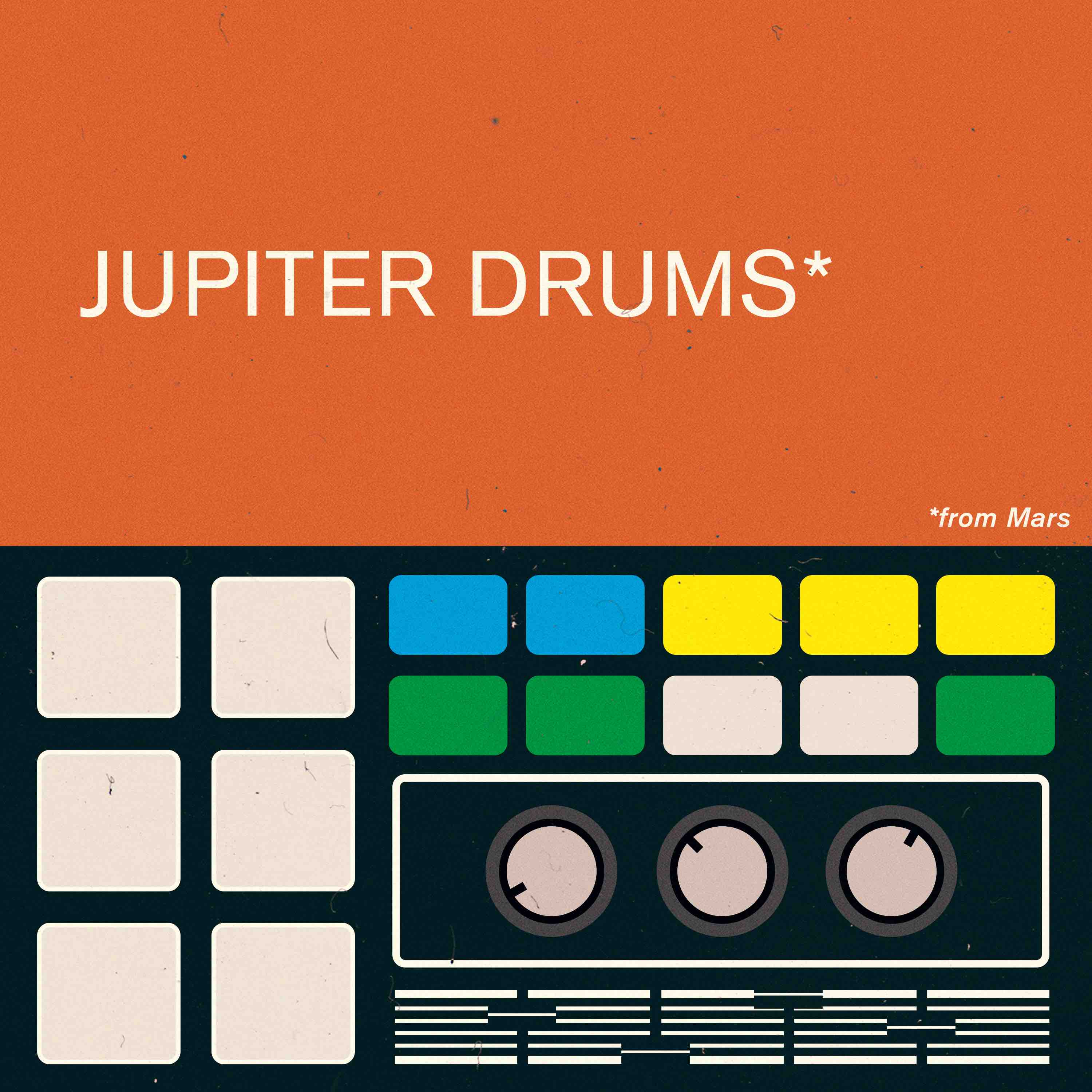JUPITER DRUMS FROM MARS
$19.00 $9.50
Analog Drum Hits Synthesized from Scratch
Jupiter Drums From Mars is a collection of raw, analog drum hits synthesized from scratch using the Jupiter 4 synthesizer, and captured cleanly through an API 1608 console with no processing or layering whatsoever.
Released in the late 70s, the JP-4 was Roland's first polyphonic synth, and it remains one of the most powerful and responsive synthesizers ever made. And while it's definitely capable of lush pads and epic chords, the Jupiter's wide variety of expressive controls also make it ripe for synthesizing powerful, analog drum hits reminiscent of Roland's early drum machines - but more unique.

The Sound of the Jupiter
The Jupiter 4 is, in my opinion, not only the most raw sounding and punchy of the Jupiter series, but one of the most powerful polysynths ever made. It's one of the few polys that can sound as powerful as a mono when you play a bassline.
The VCOs are massive sounding, and the filter (BA662), which can also be found on the Promars, SH-9 and other favorites, has a deeply musical resonance that provides classic zaps, odd harmonics and howling self-oscillation.
The controls on this synth are some of the most expressive and responsive I've ever used. The envelopes are lightning fast, and the LFO can easily go into audio rate. Even the Keyboard Follow switch results in drastic changes.

The chorus is beautiful, and can create a gigantic stereo image; unwieldy for most mixes = perfect for samples. And the VCA can go from clean, to smooth harmonic overdrive, to downright nasty distortion.
All of these offerings make the Jupiter 4 perfect for sculpting sweet, vintage analog drum hits that can easily be mistaken for some unknown vintage drum machine or rhythm box. The following demo has no processing other than a touch of reverb and delay.
Crafting the Drums
Creating useable drums from a synth requires creativity, patience, and thinking outside of the box. The basic building block of drum hit synthesis begins with an oscillator whose pitch is modulated by an ADSR. Because the Jupiter doesn't have this modulation capability inherently, the first step was to actually to turn off the oscillators, and send the resonance into self oscillation, creating our own sine wave oscillator, whose pitch is controlled by the cutoff position of the filter. Now, the filter ADSR (which modulates the cutoff) is modulating the frequency of our resonant sine wave oscillator.
Bass Drums
This type of pitch modulation synthesis is the foundation of the 808 and 909 bass drum, where the ADSR of the pitch (the filter envelope in our case), the ADSR of the VCA, the oscillator frequency (our filter cutoff) and VCA distortion all play a major role in shaping kicks. By using these controls to shape the wave, you can get massive sounding kicks without using any processing at all:
Everything Else
For more drum hits, we started engaging other controls - turning on the noise for snares, adding the highpass filter for hi hats, and varying the resonance, cutoff and envelope to taste. By lengthening the decay we turned the hats into crazy, white noises crashes, adding Ensemble for that gigantic stereo sound. Then, we tightened up the release, slowed down the attack, and cranked the VCA , giving us gritty, 808 style maracas:
No Processing Whatsoever
After sculpting all of the drum hits, it was time to process everything. Except we didn't! The Jupiter 4 has such a rich character on its own (especially with that over-driveable VCA) that we wanted to keep this pack raw - so we left everything completely clean (ie: no subtractive processing), with no layering. In the same way an 808 or 909 is the ultimate building block to sculpt from, these sounds will shine if you choose to add your own processing to them.
The Results
After synthesizing about 500 drum hits in this fashion, we spent weeks slicing and racking the results - taking notes, deleting hits, re-sampling, organizing, etc. This is simultaneously the hardest, most tedious, and most important part of the entire process. It's where the sample pack can become 50% better than it was before, only by taking things away, organizing, and making sense of it all.
Finally, we narrowed the sample count down to a 192 sample collection of sweet, analog drum hits, that could easily be mistaken for some rare, Roland drum machine that we got our hands on (the Jupiter Drum Machine From Mars?).
Contents:
- 192 24bit WAV Samples
- Custom, Analog drum hits synthesized from scratch
- Roland Bass Drums, Analog Snares, Cutting Claps, White Noise Hats, Cosmic Toms, Crashes, Percussion, Maracas, and Wonky FX.
- Fully analog white noise snaps, zaps and pops
- Sub bass kicks, distorted bells, whistles, lasers and more
- Sampled through an API 1608 console and Apogee Symphony
- 100% Hardware processing
- (13) 16x Hit Kits for easy jamming
- 108.3 MB Unzipped
- About
Formatting:
- Ableton includes (1) master drum rack containing all samples, and (13) additional pre-made kits racks.
- Kontakt, Logic, Reason, SFZ, FL Studio include: (21) Individual Hits and Kits instruments
- Maschine, Battery & FL Studio include: (13) pre-made kits.
- MPC1000 and MPC2500 include: (13) pre-made kits on 4 programs
- MPC Live and MPC X include: (13) pre-made kits on 4 programs
- 108.3 MB Unzipped Requirements
Ready For:
- Any 24 bit WAV Compatible DAW or Sampler
- Ableton Live 9.7+ (Not Intro)
- Kontakt 5.6.5+ (Not Kontakt Player)
- Logic 9+
- Maschine 2.6+
- Reason 8+
- Battery 4.1.5+
- FL Studio 20.8+
- MPC1000, MPC2500, MPC Live, MPC X
Contents:
- 192 24bit WAV Samples
- Custom, Analog drum hits synthesized from scratch
- Roland Bass Drums, Analog Snares, Cutting Claps, White Noise Hats, Cosmic Toms, Crashes, Percussion, Maracas, and Wonky FX.
- Fully analog white noise snaps, zaps and pops
- Sub bass kicks, distorted bells, whistles, lasers and more
- Sampled through an API 1608 console and Apogee Symphony
- 100% Hardware processing
- (13) 16x Hit Kits for easy jamming
- 108.3 MB Unzipped
- About
Formatting:
- Ableton includes (1) master drum rack containing all samples, and (13) additional pre-made kits racks.
- Kontakt, Logic, Reason, SFZ, FL Studio include: (21) Individual Hits and Kits instruments
- Maschine, Battery & FL Studio include: (13) pre-made kits.
- MPC1000 and MPC2500 include: (13) pre-made kits on 4 programs
- MPC Live and MPC X include: (13) pre-made kits on 4 programs
- 108.3 MB Unzipped Requirements
Ready For:
- Any 24 bit WAV Compatible DAW or Sampler
- Ableton Live 9.7+ (Not Intro)
- Kontakt 5.6.5+ (Not Kontakt Player)
- Logic 9+
- Maschine 2.6+
- Reason 8+
- Battery 4.1.5+
- FL Studio 20.8+
- MPC1000, MPC2500, MPC Live, MPC X










